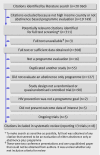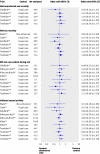Sexual abstinence only programmes to prevent HIV infection in high income countries: systematic review
- PMID: 17656503
- PMCID: PMC1939793
- DOI: 10.1136/bmj.39245.446586.BE
Sexual abstinence only programmes to prevent HIV infection in high income countries: systematic review
Abstract
Objective: To assess the effects of sexual abstinence only programmes for HIV prevention among participants in high income countries.
Design: Systematic review.
Data sources: 30 electronic databases without linguistic or geographical restrictions to February 2007, contacts with experts, hand searching, and cross referencing.
Review methods: Two reviewers independently applied inclusion criteria and extracted data, resolving disagreements by consensus and referral to a third reviewer. Randomised and quasirandomised controlled trials of abstinence only programmes in any high income country were included. Programmes aimed to prevent HIV only or both pregnancy and HIV. Trials evaluated biological outcomes (incidence of HIV, sexually transmitted infection, pregnancy) or behavioural outcomes (incidence or frequency of unprotected vaginal, anal, or oral sex; incidence or frequency of any vaginal, anal, or oral sex; number of partners; condom use; sexual initiation).
Results: The search identified 13 trials enrolling about 15,940 US youths. All outcomes were self reported. Compared with various controls, no programme affected incidence of unprotected vaginal sex, number of partners, condom use, or sexual initiation. One trial observed adverse effects at short term follow-up (sexually transmitted infections, frequency of sex) and long term follow-up (sexually transmitted infections, pregnancy) compared with usual care, but findings were offset by trials with non-significant results. Another trial observed a protective effect on incidence of vaginal sex compared with usual care, but this was limited to short term follow-up and countered by trials with non-significant findings. Heterogeneity prevented meta-analysis.
Conclusion: Programmes that exclusively encourage abstinence from sex do not seem to affect the risk of HIV infection in high income countries, as measured by self reported biological and behavioural outcomes.
Conflict of interest statement
Competing interests: None declared.
Figures
Comment in
-
Is there a role for abstinence only programmes for HIV prevention in high income countries?BMJ. 2007 Aug 4;335(7613):217-8. doi: 10.1136/bmj.39287.463889.80. BMJ. 2007. PMID: 17673733 Free PMC article.
-
Review: sexual abstinence only programmes do not affect STIs or HIV risk behaviours in high-income countries.Evid Based Nurs. 2008 Jan;11(1):9. doi: 10.1136/ebn.11.1.9. Evid Based Nurs. 2008. PMID: 18192514 No abstract available.
References
-
- Joint United Nationals programme on HIV/AIDS. Report on the global AIDS epidemic Geneva: UNAIDS/WHO, 2006
-
- Devaney B, Johnson A, Maynard R, Trenholm C. The evaluation of abstinence education programs funded under title V section 510: interim report Princeton, NJ: Mathematica Policy Research, 2002
-
- Haskins R, Bevan C. Abstinence education under welfare reform. Child Youth Serv Rev 1997;19:465-84.
-
- Moore K, Sugland B. Using behavioral theories to design abstinence programs. Child Youth Serv Rev 1997;19:485-500.
-
- Thomas M. Abstinence-based programs for prevention of adolescent pregnancies. J Adolesc Health 2000;26:5-17. - PubMed
Publication types
MeSH terms
LinkOut - more resources
Full Text Sources
Medical



